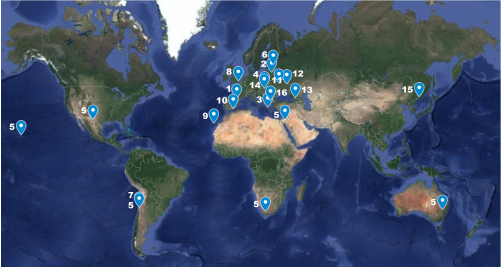Supporting the planetary sciences community with the Europlanet Telescope Network
- 1Space Research Institute, Austrian Academy of Sciences, Graz, Austria (manuel.scherf@oeaw.ac.at)
- 2School of Physics & Astronomy, University of Edinburgh, Edinburgh, UK
- 3Vilnius University, Vilnius, Lithuania
- 4Escuela de Ingeniería de Bilbao, University of the Basque Country (UPV/EHU), Bilbao, Spain
- 5Adam Mickiewicz University, Poznan, Poland
- 6) Observatoire de Paris, IMCCE, Paris, France
Since February 2020, the Horizon 2020 research infrastructure project Europlanet 2024 (EPN 2024 RI; website: bit.ly/2Z1XA8u) is serving the planetary sciences community with diverse schemes and funding opportunities. As part of this project, the Europlanet Telescope Network (website: bit.ly/37SCiyj), a collaboration between small telescope facilities in Europe and beyond, kick-started in June of the same year with the goal to provide coordinated observations, support for space missions, and to better integrate amateur astronomers into planetary sciences. Since then, the network is providing access for professional and citizen scientists to 16 different observatories ranging from 40cm to 2m in size (see figure and list below). While the network plans to draw in additional facilities and to build new collaborations, scientists and amateurs can apply through a rolling Call for Observations (website: bit.ly/2Br5LDt) to visit those facilities that are already participating in the network and have their expenses reimbursed for the time needed to make their observations. This also comprises the possibility of remote observations since the network includes 14 robotic or remotely operated facilities. Any of the short applications to the call (2 to 3 pages in size) will be reviewed anonymously by the Science Advisory Panel on a bi-monthly basis which should assure a relatively fast reaction to potential observational alerts.

Even though the focus of the network is on planetary sciences and exoplanets, the project does also accept applications covering other scientific areas. The first proposals granted, therefore, cover a diverse scientific field, ranging from asteroids to exoplanets, and the observation of variable nebulae. This presentation will review the Europlanet Telescope Network and the facilities involved, how researchers and amateur astronomers can apply, and will also give examples on the first observations performed at the network.
Besides coordinated observations at the Europlanet Telescope Network, this project also supports the integration of amateur astronomers into planetary sciences through the organization of dedicated workshops and the provision of a newly developed web platform for the issuing of observational alerts and the organization of coordinated campaigns. While we will overview these activities in the second part of our presentation, we will also give an outlook onto the upcoming years and on the support that we are yet planning to provide for amateur astronomers and the planetary sciences community.
The telescopes in the network:
1. Pic du Midi Observatory, France: 1.06-m telescope
2. Moletai Astronomical Observatory, Lithuania: 1.65-m and 35/51-cm telescopes
3. Kryoneri Observatory, Greece: 1.2-m telescope
4. Skalnate Pleso Observatory, Slovakia: 1.3-m and 61-cm telescopes
5. Faulkes Telescope Project: two 2-m, nine 1-m, and ten 40-cm robotic telescopes
6. Tartu Observatory, Estonia: 1.5-m and 60-cm telescopes, and 30-cm robotic telescope
7. Danish 1.54-m telescope at La Silla Observatory, Chile: 1.54-m telescope
8. Beacon Observatory, UK: 42-cm telescope
9. Observatorie del Teide, Spain: 82-cm and 45-cm telescopes
10. Calar Alto Observatory, Spain: 1.23-m telescope
11. Lisnyky Observation Station, Ukraine: 70-cm telescope
12. Chuguev Observatory, Ukraine: 70-cm telescope
13. Terskol Peak Observatory, Ukraine: 2-m and 60-cm telescopes
14. Konkoly Observatory, Hungary: 1-m and 80-cm telescopes
15. Ussuriysk Astrophysical Observatory, Russia: 25-cm and 50-cm telescopes
16. Rozhen Observatory, Bulgaria: 2-m, 60-cm, and 50/70-cm telescopes
Further information on the different facilities can be found at bit.ly/2Br5LDt.
Acknowledgements. Europlanet 2024 RI has received funding from the European Union’s Horizon 2020 research and innovation programme under grant agreement No 871149.
How to cite: Scherf, M., Snodgrass, C., Tautvaisiene, G., Hueso, R., Podlewska-Gaca, E., Colas, F., Garate-Lopez, I., Langner, K., and Kargl, G.: Supporting the planetary sciences community with the Europlanet Telescope Network, Europlanet Science Congress 2021, online, 13–24 Sep 2021, EPSC2021-549, https://doi.org/10.5194/epsc2021-549, 2021.

